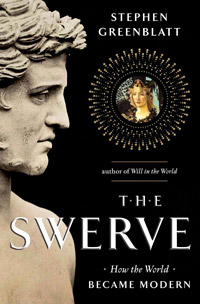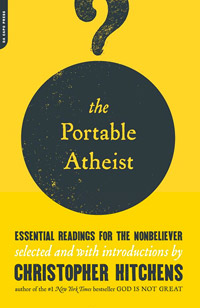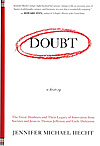In this week’s eSkeptic:

NEW ON LATIMES.COM
E-book overkill: Justice Dept. trustbusters should‘ve left Apple and book publishers alone
The US Justice Department filed suit last week against Apple Inc. and two major book publishers, Macmillan and Penguin Group USA, accusing them of colluding in 2010 to raise the prices of e-books. Read Michael Shermer’s response to the matter in Monday’s Los Angeles Times.
Our Next Lecture at Caltech:
Dr. Leonard Mlodinow
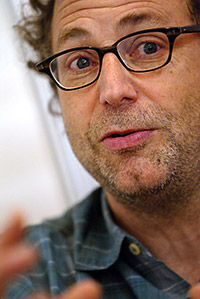
Subliminal: How Your Unconscious Mind Rules Your Behavior
with Dr. Leonard Mlodinow
Sunday, April 29, 2012 at 2 pm
Baxter Lecture Hall
FROM THE BEST-SELLING AUTHOR of The Drunkard’s Walk and coauthor of The Grand Design (with Stephen Hawking) and War of the Worldviews (with Deepak Chopra) comes a fascinating, illuminating examination of the profound ways in which the unconscious mind shapes our lives. Every aspect of our mental lives plays out in two versions: one conscious, which we are constantly aware of, and the other unconscious, which remains hidden from us. Over the past two decades researchers have developed remarkable new tools for probing the unconscious, or subliminal, workings of the mind. This explosion of research has led to a sea change in our understanding of how the mind affects the way we live. As a result, scientists are becoming increasingly convinced that how we experience the world—our perception, behavior, memory, and social judgment—is largely driven by the mind’s subliminal processes and not by the conscious ones, as we have long believed.
TICKETS are first come, first served at the door. Seating is limited. $8 for Skeptics Society members and the JPL/Caltech community, $10 for nonmembers. Your admission fee is a donation that pays for our lecture expenses.
Followed by…
Consciousness: Confessions of a Romantic Reductionist
with Dr. Christof Koch, Sunday, May 13, 2012 at 2 pm
Baxter Lecture Hall, Caltech, Pasadena, CA
About this week’s eSkeptic
In this week’s eSkeptic, Matthew Ainsworth reviews Stephen Greenblatt’s book: The Swerve: How the World Became Modern (W.W. Norton, 2011, ISBN: 0393064476).
Matthew F. Ainsworth holds an MA in American history, an MS in Library and Information Science, and is a member of The Magic Collectors Association. He is researching a cultural history of entertainment magic in America. He is also an atheist who enjoys membership in the New York Society for Ethical Culture.
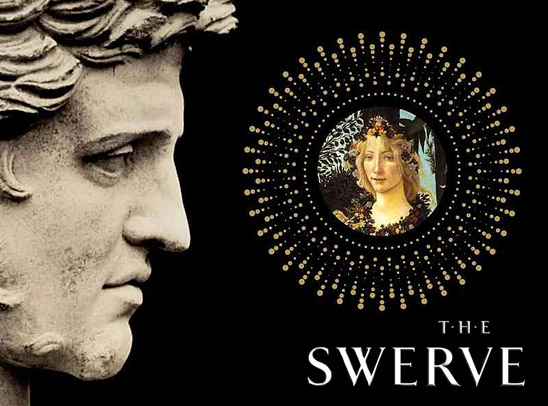
How the World Swerved Toward Science
by Matthew F. Ainsworth
What do atoms, evolution, atheism, and sex have in common? One answer is De Rerum Natura (On the Nature of Things, sometimes translated as On the Nature of the Universe). This ancient Roman poem by Lucretius has inspired intellectuals for centuries and is a prime source for our knowledge of Epicurean philosophy, which added the pursuit of pleasure to Democritus’s theory of atoms, while extending the anti-theistic implications of the atomic theory. Unlike the other philosophers’ writings at the time, De Rerum Natura survived and, according to contemporaries, explained it more eloquently. The poem’s 15th century rediscovery and controversial implications are the subject of a surprisingly engaging and intellectually wide ranging new book by Stephen Greenblatt (Will in the World), The Swerve: How the World Became Modern.
The Preface opens, appropriately, with Greenblatt’s own discovery of the poem, which begins erotically (with Venus in the lap of Mars), but continues on to philosophy, death, and life, including the theory of atoms and evolution. “I marveled—I continue to marvel—that these perceptions were fully articulated in a poem written more than two thousand years ago”(6), writes Greenblatt, praising the poem’s “scientific vision of the world…with a poet’s sense of wonder”(8). This personal sense of discovery is also the theme of the first two chapters of The Swerve in which the controversial text of De Rerum Natura is rescued in 1417 from centuries of neglect by Poggio Bracciolini, a man who personifies the Renaissance ideal of the rebirth of classical learning. Greenblatt explains that many classical Greek and Roman texts that survived the collapse of their civilizations, decay, neglect, and fire, were preserved in monasteries but tragically later lost when monks scraped the ink from the pages of the scrolls they were indifferent to, to sell the paper for scrap or use it to copy religious texts. In 1417, on a cold January day the ancient text Poggio finds in a remote monastery, and gets permission to have copied, is Lucretius’s De Rerum Natura. Poggio’s excitement is conveyed in quotation from letters he wrote, with Greenblatt masterfully filling in context to make the scene vivid without slipping into the invention of detail.
Greenblatt then takes us back 1500 more years, reconstructing what little can be known of the man who created De Rerum Natura, and marveling that such a fragile piece of parchment survived at all. Lucretius is known to have written only one work, and less is known about him than about other ancient writers (according to The Dictionary of Literary Biography, Volume 211: Ancient Roman Writers, 154). Approximate contemporaries of Lucretius, the great philosopher poets Cicero (d. 43 BC) and Ovid (d. 17AD) praise the poem as Greenblatt reflects on the irony that the ancient eruption of the volcano Vesuvius, in destroying a city, preserved portions of it for future scholars including, it was recently confirmed, an original fragment of the Lucretius poem.
Greenblatt then returns to the early 15th century, discussing the historical context of the Florentine Renaissance and the early life of Poggio, and then his profession as Papal secretary and scriptor (part executive assistant, part intellectual counselor, part lawyer). Greenblatt then gets to the heart of Lucretius’s poem: atomism and what we would now call the scientific worldview, which turns out to be a scathing critique of religion and the supernatural, and a plea to live life responsibly but with pleasure. It is from the theory that invisible particles called atoms make up the universe that the other arguments in the poem follow, and it is thus fitting that the title of Greenblatt’s book, The Swerve, refers to a key passage saying that it is when atoms swerve from their straight course that life and change happens, including free will (188–189). Lucretius’s advocacy of what we would now call evolution follows from this. To quote Lucretius: “Sight did not exist before the birth of the eyes, nor speech before the creation of the tongue” (De Rerum Natura, book four, lines 836–837 (190). That the universe was not created for humans is implicit (190), and the finality of death (192–193) leads, at least in Greenblatt’s summary, to the conclusion that religion is false (193–195). Greenblatt (183–184) qualifies, with quotation, that Lucretius’s poem emphatically and poetically argues that Gods do exist but do not impact the ways nature works and do not intervene in human affairs. (Excerpts from Lucretius’ poem are the first selection in recently deceased skeptic Christopher Hitchens’ collection of writings on atheism, The Portable Atheist). This view leads to a measured celebration of pleasure, including what the poet W.B. Yeats called “the finest description of sexual intercourse ever written” (197).
Greenblatt ends by considering the poem’s cultural impact, much of which is presumptive: passages in a famous text (the executed heretic Giordano Bruno, the pioneering astronomer Galileo Galilei, Thomas More’s Utopia) are discussed at length by Grenblatt, and while they may echo Lucretius’ topics or style, it is too often without proof that they are referring to him. The case of Galileo is interesting: his 1633 Inquisition conviction was believed to be solely for his astronomical science, especially his 1632 Dialogue. “But in 1982 an Italian scholar…found…in the archives of the Holy Office….a memorandum detailing…evidence of atomism….” (p. 255) in Galileo’s 1623 The Assayer. Lucretius’s poem was the main way people learned of atomism in this era, so the evidence is circumstantial.
This is not to say that De Rerum Natura’s place in history is insecure, especially as a result of Poggio’s recovery. It was published by pioneering printer Aldus Minutis, and it was criticized formally: In 1516 the Florentine Synod prohibited teaching of Lucretius (226), although a 1549 proposal to include it on the Catholic Church’s Index of Prohibited Books was defeated. Leading intellectuals annotated their copies, or discussed it in writing: In 1961 it was confirmed by new techniques that the notes in a copy of De Rerum Natura now held by the Vatican were made by the political philosopher Niccolò Machiavelli (221), who joins French essayist Montaigne (243–249) and Thomas Jefferson (262–263) as confirmed fans.
Readers of Skeptic critical of the paranormal will, beyond mentions in Swerve, be intrigued to read that De Rerum Natura is quoted in the last two pages of Reginald Scot’s 1584 book The Discoverie of Witchcraft, while librarian Daniel Boorstin’s history from almost exactly four centuries later (The Discoverers) judges that “In one of the greatest Latin poems, De rerum natura, Lucretius…perpetuated ancient atomism” and argued that “there was no reason to fear death or supernatural powers,” concluding that Lucretius “became one of the most influential figures in the Renaissance” (Vintage, 1984, pp. 675–676).
Readers familiar with Lucretius’s poem may still be entranced by Greenblatt’s telling of its 1417 recovery and his discussion of the man who did so. Readers not familiar with Lucretius might want to start with the book’s final two chapters to appreciate the poem’s impact, before reading of its rediscovery. I’ve read few books in which sentences flow as easily as they do in Greenblatt’s Swerve. In lesser hands his parallel telling of the poem’s creation, recovery, and philosophical and religious implications would be confusing, but Greenblatt has the skill to pull it off: he seems comfortable in a range of academic disciplines, and he implicitly and explicitly draws parallels between the stories, the one enhancing the other: the theme of the Renaissance rediscovery, rather than a strictly chronological format, is a metaphor for the love of learning that is a theme for Greenblatt, and a hook for the discussion of the poem’s greatest impact in the 16th through 18th centuries, the Age of Reason and the Enlightenment.
The impact of Lucretius’s On the Nature of Things, the number of authors it influenced, is so great that some of the book’s puffery is unnecessary and makes me cringe. The praise or fascination by Cicero, Ovid, Machiavelli, Montaigne, Thomas Jefferson and W.B. Yeats are unambiguous, but the inner text reveals that the jacket copy paragraph emphasizing the impact on Galileo, Freud, Darwin, and Einstein is tenuous. Some of Greenblatt’s discussion of the impact of Lucretius is speculative: Virgil’s writing alluded to Lucretius, Erasmus and Thomas More discuss themes probably taken from Lucretius, the evidence for Shakespeare’s reading Lucretius is strong but circumstantial. Of Darwin and Einstein Greenblatt argues that if they were not influenced directly, it was because “these were only signs of Lucretius’ absorption into modern thought.” (262). Thus the subtitle of Greenblatt’s book, “How the World Became Modern” is publisher’s puffery, but not as egregious an example of it as I had thought before I read the book.
I could nitpick: a reference work (the aforementioned Dictionary of Literary Biography, p. 156) states that the poem is 7415 lines, not the 7400 lines that Greenblatt states (p. 182). Is Greenblatt approximating, has scholarship changed, or is the different line count due to a different translation? When Poggio recovered the text in 1417, he immediately sent his one and only copy to a friend, who apparently shared it with no one and did not return it to him until at least the end of 1429 (209). Does this make the repeated claim that Poggio returned Lucretius to circulation in 1417 (for example, p. 256) somewhat misleading? There are also cases where I might have written the book differently: lacking Greenblatt’s skill, a strictly chronological format might have made the arc of Lucretius’s impact easier to follow. Although there are quotes from Lucretius throughout Swerve, I would have been grateful for an appendix with extended excerpts. A timeline, including Lucretius’s approximate dates (they are in dispute, and the year he published De Rerum Natura unknown), major subsequent references to Lucretius and his poem, and key edition publications, would enhance understanding of the poem’s impact in a way that the inclusion of the same facts scattered throughout the text does not.
But these quibbles with Greenblatt’s book are small ones. Swerve is erudite and intellectually stimulating on multiple levels. The history of books and the love of learning, the tension between religion and science, and a critique of religion and the supernatural are all themes of Greenblatt’s graceful multilayered philosophical history.
Skeptical perspectives from Jennifer Michael Hecht…
-
 Doubt: A History (the lecture)
Doubt: A History (the lecture)
by Dr. Jennifer Michael Hecht
Announcing The Amaz!ng Meeting 2012
Southpoint Hotel & Casino, Las Vegas, NV
July 12–15, 2012
THE AMAZ!NG MEETING (TAM) is an annual celebration of science, skepticism and critical thinking. People from all over the world come to TAM each year to share learning, laughs and the skeptical perspective with their fellow skeptics and a host of distinguished guest speakers and panelists.
The James Randi Educational Foundation (JREF) has hosted its annual Amaz!ng Meeting since 2003 as a way to promote science, skepticism and critical thinking about paranormal and supernatural claims to the broader public. TAM has been held in Las Vegas, NV since 2004 and has become the world’s largest gathering of like-minded science-advocates and skeptics.
With yet another incredible lineup of speakers, hands-on workshops, and entertainment, this is sure to be an Amaz!ng Meeting you won’t want to miss! Check out the entire program, and follow @jref on Twitter for the latest #TAM2012 news and announcements.


